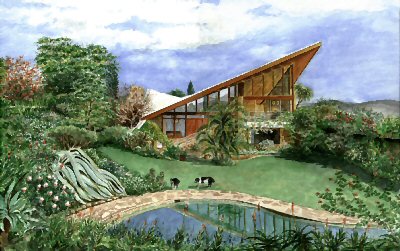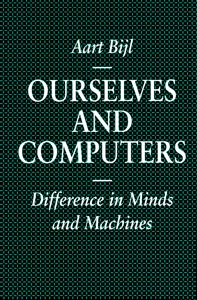
Home

 The famous Bruynzeel House in Stellenbosch was designed by Aart Bijl Painting by Hérine Fourie |

 Aart and Val Photos by Andrew Buchanan |
Aart Bijl in 2010
1935: Born in the Netherlands, in Voorburgh.
1936: My parents emigrated to South Africa, to avoid a second world war.
1941: I became ill with bone tuberculosis.
1947: My mother brought me to London UK, to seek medical help for me, and she died that same year - my father then came to the UK.
1948: Went to a progressive (A S Neill type) school, Burgess Hill, in London, which enabled me to catch up on much missed schooling and gain a GCSE.
1951: Rejoined my father and his new wife who had earlier returned to South Africa.
1953: Got my Matric.
1959: Graduated B.Arch with a 1st class pass, from Cape Town University.
The architectural practice of Bijl Green & Todeschini was formed (having previously been operating somewhat informally as a design office).
I took a year out to work in the practice of Van Den Broek and Bakema, in Rotterdam, the Netherlands.
1960: Having done some work for the Bruynzeel organization, our practice received a commission from Mr Bruynzeel himself to design what was to become 'House Bruynzeel' or 'Die Hoge Hoek'.
1961: Our practice became a casualty of business uncertainty after Sharpville.
We formed an association with Munnik Visser & Black, Architects, to complete the construction of House Bruynzeel.
1962: I met Valerie, we married and we moved to the UK, again to seek medical help. And towards the end of that year our first child was born, a son, Paul.
1963: Employed in the London architectural practice of Cowper Poole & Partners.
Experience of British practice: involvement of many authorities and long time scales to do anything, I found daunting.
1965: My wife and I moved to Edinburgh, to join the Architectural Research Unit (ARU) in the Department of Architecture at Edinburgh University.
1966: Birth of our daughter, Sally.
1968: Started my research unit as an adjunct to the ARU, the Edinburgh Computer Aided Architectural Design unit, EdCAAD. My driving interest was to explore the use of computers to test my skepticism of current enthusiasms for formal logically determined design methods - people can fudge what they say they do, Computers can't.
1970: The work of my unit uncovered deep questions about design, and about computing and the associated specializations of artificial intelligence and knowledge processing.
We gained a strong reputation both in computer applications and the fundamentals of computer systems, writing many papers and attending conferences around the world.
1986: Invited to visit a computer company in Japan which was using a logic programming language, PROLOG, a version which was implemented by Fernando Pereira in my research unit - and attended a CAD conference in Tokyo.
1989: A visiting professorship at Tokyo University.
I was struck by the Japanese academics' ability to blend philosophy and technology in the same conversation, something unlikely to happen in the UK.
1996: Moved from Edinburgh to the Dumfries and Galloway countryside, in retirement.
In my later years at EdCAAD it became clear to me that the questions posed by computers and design are really far more general than that suggests, they apply to all activities where people are answerable to each other, to other people. And I am still thinking about that.
2019: Aart Bijl died on 20 August 2019.
Aart has published some 80 articles in journals.
2012: Still writing but slow and getting slower, a further book may be the outcome:
Cybermania-& What Computers Can't Do.
 Selection of Publications
Selection of Publications1968: Bijl A: Decisions Affecting Design of Five Point Blocks (Ministry of Public Building and Works (MPBW)).
1968: -- with Renshaw T: Introduction to computers: including organisation and processing of data (Edinburgh University Architecture Research Unit (ARU)) - (An interesting first report by two architects on our understanding of what computers were about, before EdCAAD was formed). 1971: -- with Renshaw T, Barnard D et al: House Design-Application of Computer Graphics to Architectural Practice (University of Edinburgh ARU).
1971: --: Application of Computer Graphics to Architectural Practice (Edinburgh University EdCAAD).
1974: -- with Shawcross G et al: Site Layout Project (EdCAAD, for Scottish Special Housing Association and government Department of the Environment (SSHA/DoE)). 1979: --: Computer Aided Housing and Site Layout Design-Experience of research software in use in a production environment (proc. PArC, Berlin).
1979: --: with Stone D, Rosenthal D: Integrated CAAD Systems. (EdCaaD, for the DoE ).
1979: --: with Steele S, Rosenthal D et al: Investigation of Evolutionary Data Centered CAAD Systems (EdCAAD report to Science Research Council (SRC)). 1979: Holmes C: Subsets of 2-D Space (EdCAAD)
1980: Bijl A: The revolution is here to stay: a review of computer aided architectural design; invited paper for Building Design Session, CAD80, Brighton UK
1989: --: Computer Discipline And Design Practice - Shaping Our Future (Edinburgh University Press).
1995: --: Ourselves And Computers - Difference In Minds and Machines (Macmillan). Some designs depicted in this book
![]() www.StellenboschWriters.com © Rosemarie Breuer
www.StellenboschWriters.com © Rosemarie Breuer